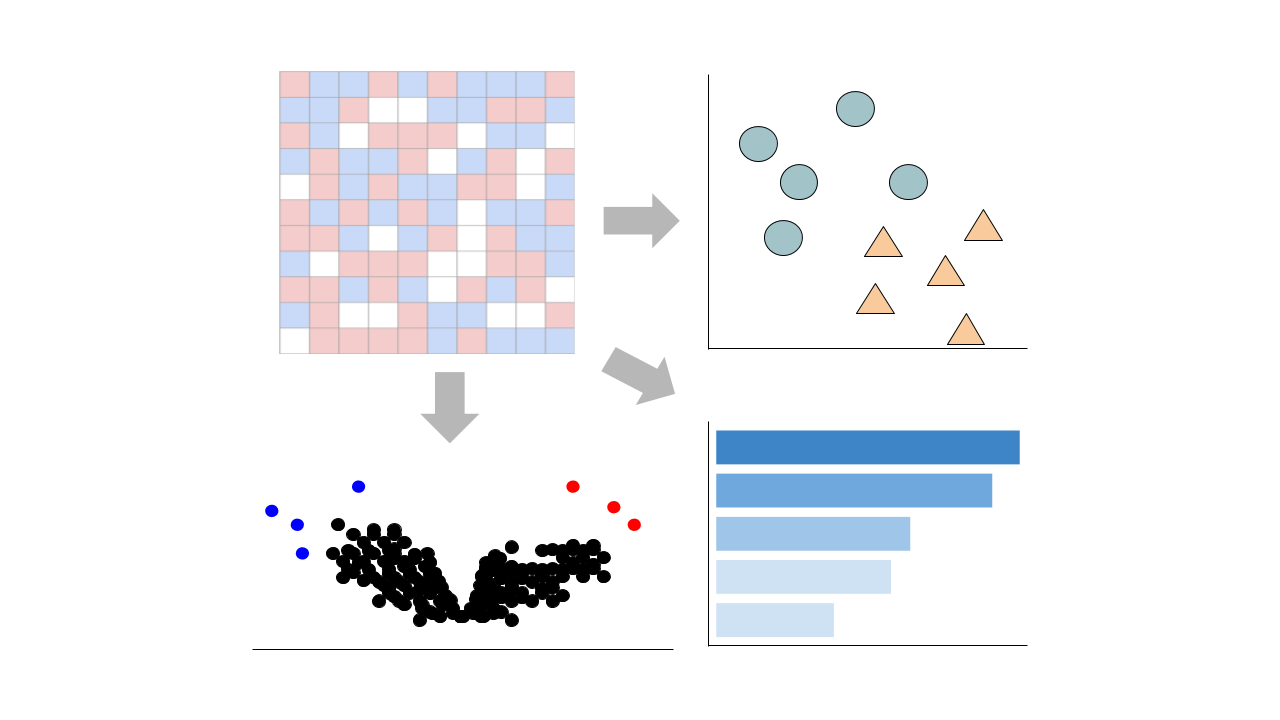 Gene counts are sourced from ARCHS4, which provides uniform alignment of GEO samples.
You can learn more about ARCHS4 and its pipeline here.
Gene counts are sourced from ARCHS4, which provides uniform alignment of GEO samples.
You can learn more about ARCHS4 and its pipeline here.
Select conditions below to toggle them from the plot:
| GROUP | CONDITION | SAMPLES |
|---|---|---|
| breast cancer cell line MCF7 |
GSM2574347
|
|
|
GSM2574348
|
Submission Date: Apr 11, 2017
Summary: Metabolic diseases, including type 2 diabetes and obesity are relevant negative prognostic factor in patients with breast cancer (BC). We have investigated the mechanisms through which elevated glucose levels affect tamoxifen sensitivity of estrogen receptor positive (ER+) BC cells. We found that MCF7 BC cell sensitivity to tamoxifen was 2-fold reduced in 25mM glucose (HG), a concentration mimicking hyperglycaemia, compared to 5.5 mM glucose (LG), resembling normal fasting glucose levels in humans. Shifting MCF7 cells from HG to LG ameliorated their responsiveness to tamoxifen. RNA-Sequencing revealed that glucose modified the transcriptome of MCF7 cells. In particular, cell cycle-related genes were affected by glucose. Combining gene specific knockdown and treatment with human recombinant proteins, we identified the Connective Tissue Growth Factor (CTGF) as glucose-induced factor able to reduce MCF7 cell sensitivity to tamoxifen. Moreover, we found that both CTGF expression levels and tamoxifen responsiveness were enhanced co-culturing MCF7 cells with human adipocytes through an Interleukin-8 (IL8)-mediated mechanism. Indeed, IL8 inhibition reduced CTGF levels and rescued tamoxifen sensitivity in MCF7 cells. Interestingly, CTGF immuno-detection in bioptic specimens obtained from women with ER+ BC correlated with distant metastases (P-value = 0.000), hormone therapy resistance (P-value = 0.000), reduced overall (P-value = 0.051) and disease free survival (P-value = 0.000). Thus, glucose affects tamoxifen responsiveness directly modulating CTGF in BC cells, and indirectly promoting the adipocytes' release of IL8. Both CTGF and IL8 may represent potential targets in novel therapeutic strategies to increase tamoxifen sensitivity.
GEO Accession ID: GSE97647
PMID: No Pubmed ID
Submission Date: Apr 11, 2017
Summary: Metabolic diseases, including type 2 diabetes and obesity are relevant negative prognostic factor in patients with breast cancer (BC). We have investigated the mechanisms through which elevated glucose levels affect tamoxifen sensitivity of estrogen receptor positive (ER+) BC cells. We found that MCF7 BC cell sensitivity to tamoxifen was 2-fold reduced in 25mM glucose (HG), a concentration mimicking hyperglycaemia, compared to 5.5 mM glucose (LG), resembling normal fasting glucose levels in humans. Shifting MCF7 cells from HG to LG ameliorated their responsiveness to tamoxifen. RNA-Sequencing revealed that glucose modified the transcriptome of MCF7 cells. In particular, cell cycle-related genes were affected by glucose. Combining gene specific knockdown and treatment with human recombinant proteins, we identified the Connective Tissue Growth Factor (CTGF) as glucose-induced factor able to reduce MCF7 cell sensitivity to tamoxifen. Moreover, we found that both CTGF expression levels and tamoxifen responsiveness were enhanced co-culturing MCF7 cells with human adipocytes through an Interleukin-8 (IL8)-mediated mechanism. Indeed, IL8 inhibition reduced CTGF levels and rescued tamoxifen sensitivity in MCF7 cells. Interestingly, CTGF immuno-detection in bioptic specimens obtained from women with ER+ BC correlated with distant metastases (P-value = 0.000), hormone therapy resistance (P-value = 0.000), reduced overall (P-value = 0.051) and disease free survival (P-value = 0.000). Thus, glucose affects tamoxifen responsiveness directly modulating CTGF in BC cells, and indirectly promoting the adipocytes' release of IL8. Both CTGF and IL8 may represent potential targets in novel therapeutic strategies to increase tamoxifen sensitivity.
GEO Accession ID: GSE97647
PMID: No Pubmed ID
Visualize Samples
 Visualizations are precomputed using the Python package scanpy on the top 5000 most variable genes.
Visualizations are precomputed using the Python package scanpy on the top 5000 most variable genes.
Precomputed Differential Gene Expression
 Differential expression signatures are automatically computed using the limma R package.
More options for differential expression are available to compute below.
Differential expression signatures are automatically computed using the limma R package.
More options for differential expression are available to compute below.
Signatures:
No precomputed signatures are currently available for this study. You can compute differential gene expression on the fly below:
Select conditions:
Control Condition
Perturbation Condition
Only conditions with at least 1 replicate are available to select
 Differential expression signatures can be computed using DESeq2 or characteristic direction.
Differential expression signatures can be computed using DESeq2 or characteristic direction.
This pipeline enables you to analyze and visualize your bulk RNA sequencing datasets with an array of downstream analysis and visualization tools. The pipeline includes: PCA analysis, Clustergrammer interactive heatmap, library size analysis, differential gene expression analysis, enrichment analysis, and L1000 small molecule search.

 Chatbot
Chatbot Single Gene Queries
Single Gene Queries
 Gene Set Queries
Gene Set Queries
 Bulk Studies
Bulk Studies
 Single Cell Studies
Single Cell Studies
 Hypotheses
Hypotheses
 Resources
Resources
 Contribute
Contribute
 Downloads
Downloads About
About
 Help
Help